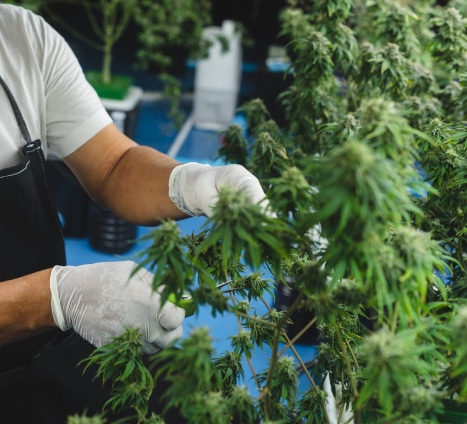How to Get a Cannabis License in North Dakota
Understanding the cannabis licensing process in North Dakota is essential for businesses and individuals looking to enter the medical marijuana industry within the state.
Since the legalization of medical marijuana in 2016, North Dakota has established a structured licensing system for the cultivation, distribution, and retail sale of cannabis for medical purposes.
This guide explains how to get a cannabis license in North Dakota, the application process, and compliance requirements in the State.


Cannabis License Regulations in North Dakota
North Dakota’s approach to cannabis regulation has evolved since medical marijuana was legalized through the passage of SB 2344 in 2016. The state has a specific framework for medical marijuana dispensaries, with a focus on serving patients with chronic, debilitating, or terminal medical conditions.
Cannabis License Regulations in North Dakota
North Dakota’s approach to cannabis regulation has evolved since medical marijuana was legalized through the passage of SB 2344 in 2016. The state has a specific framework for medical marijuana dispensaries, with a focus on serving patients with chronic, debilitating, or terminal medical conditions.
Types of Cannabis Licenses in North Dakota
Cultivation Licenses
- Purpose: Cultivation licenses are for entities that grow cannabis plants for medical use. These licensees are responsible for the initial stage of the cannabis supply chain, which involves planting, growing, harvesting, and preparing the cannabis plant for processing or direct sale to dispensaries.
- Requirements: Cultivators must adhere to strict guidelines regarding security, plant tracking, and quality control to ensure that all cultivated cannabis meets safety standards for medical use. They must also comply with environmental and agricultural regulations.
Manufacturing Licenses
- Purpose: Manufacturing licenses are for facilities that process raw cannabis from cultivation sites into various forms of medical marijuana products, such as edibles, tinctures, oils, and topical applications. These entities are pivotal in creating the final medical products that are dispensed to patients.
- Requirements: Manufacturers need to establish rigorous quality control and testing procedures to ensure product safety and consistency. They must also comply with packaging and labeling regulations designed to provide patients with clear product information and dosing instructions.
Distribution Licenses
- Purpose: While specific distribution licenses are less commonly delineated in North Dakota’s medical marijuana program, entities involved in the transportation of cannabis products play a crucial role. They ensure that medical cannabis products are securely and efficiently transported from cultivation and manufacturing facilities to dispensaries.
- Requirements: Distributors must follow stringent security and tracking protocols to prevent diversion and ensure that all cannabis products reach their intended destinations without tampering.
Dispensary (Retail) Licenses
- Purpose: Dispensary licenses are granted to retail locations where medical cannabis products are sold directly to registered patients and their caregivers. Dispensaries are the patient-facing segment of the cannabis supply chain, providing access to a variety of medical cannabis products.
- Requirements: Dispensaries must ensure that their staff are adequately trained to advise patients on product selection based on medical needs. They must also implement security measures to safeguard cannabis products and patient information.
Lab Testing Licenses
- Purpose: Lab testing facilities are essential for ensuring the safety and potency of medical cannabis products. These labs conduct tests for contaminants (such as pesticides, heavy metals, and microbial impurities) and verify cannabinoid profiles.
- Requirements: Laboratories must meet high standards for accuracy and reliability, with staff that possess the necessary scientific expertise to conduct testing. They must also maintain neutrality, with no direct ties to the cultivators, manufacturers, or dispensaries they test for.
Compassion Centers
- Purpose: In North Dakota, “Compassion Centers” encompass both dispensaries and manufacturing facilities. These centers are specifically designed to provide comprehensive services to medical marijuana patients, including access to products and educational resources.
- Requirements: Compassion Centers must meet all the regulatory requirements applicable to dispensaries and manufacturers. Additionally, they may need to provide evidence of community support and demonstrate how they will contribute to patient education and support.
In North Dakota, the application process for these licenses includes comprehensive documentation to demonstrate the applicant’s ability to comply with state regulations, financial stability, and operational plans that ensure security, product safety, and patient education. Applicants must also undergo background checks to screen for disqualifying criminal history.
For more detailed information on each license type and the specific requirements, the North Dakota Department of Health’s Medical Marijuana Program website and associated regulatory documents are primary resources. Additionally, consulting with legal and industry professionals can provide applicants with tailored guidance through the application process.
How to Obtain a Cannabis License in North Dakota?
The process of obtaining a cannabis license in North Dakota involves several steps, including the submission of a non-refundable application fee, detailed documentation of the business structure, and compliance with local zoning laws. Applicants must also undergo criminal background checks.
Requirements and Application Process
- Application Fee: Applicants must pay a non-refundable application fee of $5,000.
- Documentation: Submit legal documentation, evidence of compliance with local laws, and detailed operation plans.
- Background Checks: Principals of the business must consent to and pass criminal history record checks.
Compliance with State Regulations
Compliance involves adhering to security, safety, and operational guidelines as specified by the state, including specific requirements for manufacturing facilities and dispensaries.
Note: North Dakota medical marijuana regulations mandate patients to consult a healthcare provider who recommends the use of medical marijuana after looking at their medical records to ensure that they possess qualifying medical conditions for a medical marijuana card.
So, when conducting a B2C Cannabis business, ensure that your activities are fully legal.
Your Cannabis Business Deserves the Best
Remaining Compliant with North Dakota Regulations
Staying compliant involves regular reviews of operational practices, security measures, and adherence to product safety standards. North Dakota requires individuals to have a qualifying medical condition and a medical cannabis card to legally buy medical marijuana from dispensaries holding a valid marijuana business license. So, businesses must be diligent when selling your marijuana products in the State.
Risk and Compliance Factors
The cannabis industry involves inherent risks, including legal changes and the importance of strict compliance with regulations to avoid penalties or the loss of licensing. Individuals with debilitating medical conditions must possess a valid North Dakota medical card (medical marijuana cards) to legally purchase usable marijuana.
Final Thoughts
North Dakota’s medical marijuana program is designed to ensure safe access for patients while maintaining strict regulatory oversight. Prospective licensees must carefully navigate the application process, understanding the importance of compliance and the operational demands of running a cannabis-related business in the state.
Legal References and Citations
State laws and regulations related to cannabis licensing in North Dakota can be found in the North Dakota Century Code and the administrative rules established by the North Dakota Department of Health.
Additional Resources
For further information, the North Dakota Department of Health’s Medical Marijuana Program provides comprehensive guidelines and updates on medical cannabis in the state.
FAQ Section
- How do I apply for a cannabis license in North Dakota? Begin by reviewing the application requirements on the North Dakota Department of Health’s website and paying the application fee.
- What are the fees associated with obtaining a cannabis license? There is a $5,000 non-refundable application fee, with additional licensing fees for approved dispensaries and manufacturing facilities.
This guide offers a foundational understanding of the cannabis licensing landscape in North Dakota, emphasizing the need for thorough preparation and compliance with state regulations.